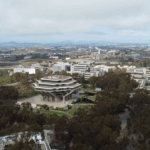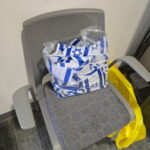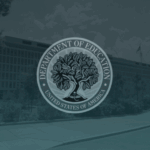Elena Kagan’s Campus Activism
Accuracy in Academia has identified four consecutive years during which Harvard Law School Dean Elena Kagan worked with the law school’s Lambda group to oppose military recruiting on campus.
Between 2003 and 2007, Dean Kagan not only used her position as Dean to encourage the academic community to protest military recruitment efforts, but was at rallies herself and appears to have coordinated her policy announcements with HLS Lambda, according to student news accounts at that time.
HLS Lambda describes itself as “a social and political student organization dedicated to serving the lesbian, gay, bisexual, and transgender (LGBT) community at Harvard Law School,” according to its website.
According to a September 22, 2003 article by Lauren A.E. Schuker, Dean Kagan sent out a September 20 statement to the HLS community about the law school’s non-inclusion in the Forum for Academic and Institutional Rights’ (FAIR) lawsuit against the Department of Defense. “‘Harvard Law School is not a member of this organization, but I share its commitment to nondiscrimination,’ Kagan said in the statement,” reported Schuker for The Harvard Crimson. “‘I look forward to the day when all Americans—regardless of sexual orientation—can serve their country with honor and distinction,’” she quoted Kagan.
(Kagan, who is the current nominee for the Supreme Court, would later join other professors signing onto a “friend of the court” brief in favor of FAIR’s position in FAIR v. Rumsfeld.)
Dean Kagan then emailed the law school community in October. “As many of you know, the U.S. military began to recruit on campus Friday, as it also did last year, notwithstanding the Law School’s anti-discrimination policy,” she wrote on October 6, 2003, according to an email reproduced by The Harvard Law Record (HLR), the law school’s independent paper. “I write to give newcomers to this community some background on this issue and to express to all of you some of my own views about it.”
In reaction to her email, Adam White, HLR’s editorial page editor, argued in an October 9 column that
“…The text of Dean Kagan’s notice moved far beyond her role as the Dean of the Law School. Her admonition was an abuse of her position of academic (but certainly not moral) authority, and it should give students pause to consider whether their new dean is capable of understanding the difference between her, the office she occupies and the school that she leads.”
Interestingly, the October 6 email invites members of the HLS community to attend an HLS Lambda conference later that month:
“I invite all of you to email me if you have any questions or comments on this important matter. I also invite you, if you wish to learn more about these issues, to attend a conference sponsored by Lambda on the military’s recruitment policies and the Solomon amendment, to be held on October 10 and 11” (emphasis added).
Actually, Dean Kagan was herself a speaker at this conference, and she used this opportunity to outline why the law school did not join the FAIR lawsuit against the Department of Defense. “No Harvard school has ever sued individually,” the HLR’s Clinton Dick quoted Kagan in the October 16, 2003 article. “‘I [Kagan] am just a part of the Harvard administration. It is a complex decision made even more complex’ because separate departments have different needs and there may be fear of retaliation if the school sued,” he quoted Dean Kagan.
“Kagan’s public statement was in fact her welcoming remarks for the two-day Lambda conference: ‘Solomon’s Minefield: Military Discrimination after Lawrence and the Coming Fight over Forced On-Campus Recruiting,’” he reported (emphasis added).
In the following years Dean Kagan appears to have integrated her activism with HLS Lambda even further .
“In 2004, Kagan and 53 other Harvard Law professors signed a friend-of-the-court brief supporting the lawsuit, but some students and faculty were disappointed that she had chosen not to lead the legal battle,” reported The Boston Globe on May 12, 2010.
“Later that year, a federal appeals court ruled that the Solomon Amendment, a 1996 law that denies federal money from schools that do not permit military recruiting, infringed improperly on the law school’s constitutional freedoms,” reported The Boston Globe. The authors classified the Harvard ban as having “more symbolic value than anything else.”
“The next day, Kagan announced that the law school would return to its pre-2002 policy of preventing the military from using the office of career services to recruit,” they reported (emphasis added).
In the embedded photograph, Kagan can be seen attending this 2004 “…LAMBDA-sponsored rally on the steps to the library …” according to Adina Levine with HLR. “‘I’m very opposed to two government policies that directly violate our policy of nondiscrimination and directly impact our students,’ stated Dean Kagan at the rally,” reported Levine on October 21, 2004.
Later, when Dean Kagan had to announce that the law school would reopen to military recruiters, she first met with HLS Lambda to discuss this change, according to THC. “Before making her policy reversal public today, Kagan attended a meeting last night of the Law School’s gay, lesbian, bisexual, and transgender student group, Lambda, to explain her decision,” reported Daniel J. Hemel and Javier C. Hernandez for THC on September 20, 2005.
The same day, Sept. 20, HLS Lambda released a statement condemning the “reinstatement of military recruiters on campus” as a “return to inequality and exclusion,” but applauding Dean Kagan’s efforts.
In November of that year the law school appointed a Solomon “task force” to “recommend methods of ameliorating the effects of on-campus military recruitment on the school’s gay and lesbian population…” according to Javier C. Hernandez with THC.
“Jeffrey G. Paik ’03, co-president of Lambda…said the committee has the support of Dean Elena Kagan, who reversed course last month and said that military recruiters would once again have access to the school’s Office of Career Services,” Hernandez reported in the Nov. 28, 2005 article. “[Committee member Brad E.] Rosen added that the task force is examining the possibility of instituting a more formal grievance procedure for students who are grappling with issues like hate crimes and same-sex sexual harassment.” Hernandez later described the task force as “appointed” by Dean Kagan.
The United States Supreme Court unanimously ruled (8-0) against FAIR on March 6, 2006, and held that allowing military officials to recruit on campus did not violate schools’ free speech rights. Justice John Roberts gave the unanimous opinion.
In reaction, Kagan wrote in an email to the HLS community on March 7 that “I [Kagan] hope that many members of the Harvard Law School community will accept the Court’s invitation to express their views clearly and forcefully regarding the military’s discriminatory employment policy,” according to Paras D. Bhayani with THC.
The writer interpreted her email to mean that she was encouraging students to actively demonstrate against those recruiters on campus. “In her message yesterday, Kagan also encouraged students to demonstrate against the presence of recruiters,” reported Bhayani on March 8, 2006.
Kagan continued to demonstrate her affinity with Lambda in 2007, and in 2008 reiterated her opposition to Don’t Ask Don’t Tell.
According to this transcript (pdf) of the HLS Lambda’s “Second Annual Gay and Lesbian Legal Advocacy Conference [on] ‘Don’t Ask Don’t Tell,’” held in March of 2007, Kagan was the moderator for the third panel, “The Contours of Judicial Deference to Military Personnel Policies.”
She says little, but the introductory remarks made by Alexis Caloza, “one of the political co-chairs” for the student group, are telling:
“On a more personal note, I would like to thank Dean Kagan for her continuing support for the lesbian, gay, bisexual, and transgendered community here at Harvard. She has been a staunch critic of the Solomon Amendment, and in the months leading up to and following the Supreme Court’s decision in FAIR v. Rumsfeld, she met regularly with students to discuss ways in which the Law School could help to ameliorate the harmful discriminatory effects of the Solomon Amendment and “Don’t Ask, Don’t Tell” generally.
This conference would not have been possible without the tremendous support HLS Lambda received from Dean Kagan and her office….”
“The capstone event of the conference was this year’s GALLA Leadership Award,” reported the HLR’s Brad Rosen on March 8, 2007. “The award is given yearly to recognize great efforts in legal advocacy.”
“Last year, Kent Greenfield was recognized for his active role in the FAIR litigation,” he reported. “This year, Lambda honored C. Dixon Osburn, on behalf of Servicemembers Legal Defense Network.”
Bethany Stotts is a staff writer at Accuracy in Academia.




